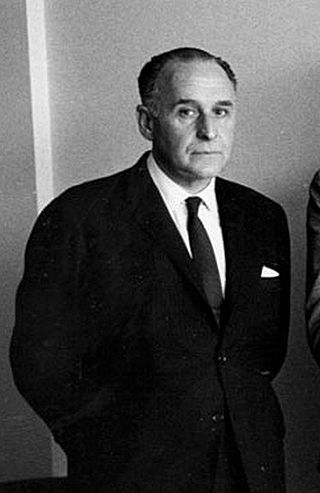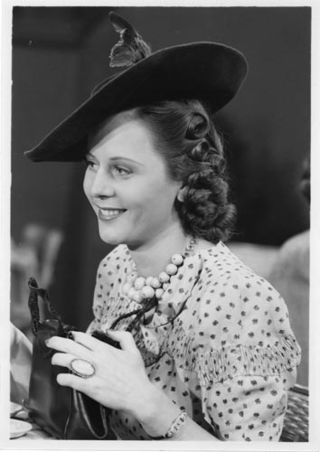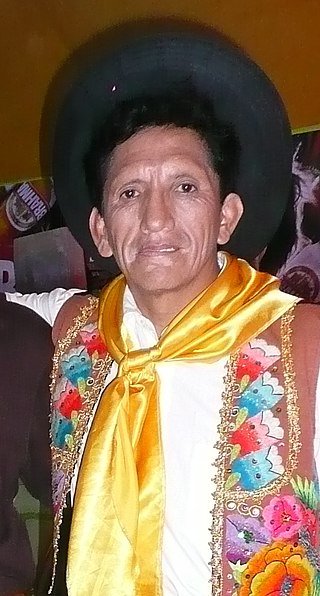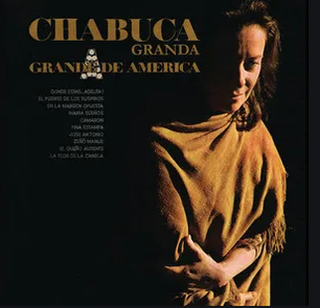
Amanda Portales Sotelo is a Peruvian singer, author, composer, and performer of Peruvian folklore, with more than 50 years of artistic experience of the Peruvian Andean culture. [1]

Amanda Portales Sotelo is a Peruvian singer, author, composer, and performer of Peruvian folklore, with more than 50 years of artistic experience of the Peruvian Andean culture. [1]
Her mother is Irene del Centro, known as the Dama Elegante of Folklore. She is an author and composer from Yauyos. Her father, Lucio Portales was from Huánuco and was a violinist and orchestra director. All her siblings are performers. Amanda Portales says she was almost born onstage. This is because her mother, director of the folklore company Juan Huquequeña, had to replace an absent dancer when her pregnancy was well advanced. While she was acting onstage, labor started. [2]
Throughout her more than 50 years of career, Amanda Portales has acquired several different names, for example: Cápac Tika singing from Cusco, Flor Collavina singing music from Puno, Flor Amanda, Amanda del Mantaro or Amanda de los Andes singing the folklore of the Center of Peru. Finally, Amanda Portales, which is her artistic name. "La Novia del Perú", was a nickname created by Antonio Muñoz Monge in 1984. [2]
In 2006 she was recognized by the Peruvian government with the Order of Merit for Distinguished Services in the Degree of Commander for being a recognized interpreter of Peruvian folklore and culture.
Portales has visited Korea, Greece, Hungary, Russia, Spain, Sweden, France, Italy, Belgium, Bolivia, Brazil, Chile, Venezuela, Argentina, the United States, Costa Rica, and Canada.
Carlos Enrique Estremera Colón was a Puerto Rican Salsa singer who was a native of Santurce, Puerto Rico. Estremera was nicknamed "el niño de oro" and later "el dueño del soneo", for his uncanny ability to improvise lyrics to Salsa music. Estremera, was albino, and billed as "El Cano".

Omara Portuondo Peláez is a Cuban singer and dancer. A founding member of the popular vocal group Cuarteto d'Aida, Portuondo has collaborated with many important Cuban musicians during her long career, including Julio Gutiérrez, Juanito Márquez and Chucho Valdés. Although primarily known for her rendition of boleros, she has recorded in a wide range of styles from jazz to son cubano. Since 1996, she has been part of the Buena Vista Social Club project, touring extensively and recording several albums with the ensemble. She won a Latin Grammy Award for Best Contemporary Tropical Album in 2009 and a Latin Grammy Lifetime Achievement Award in 2019, and she received three Grammy Award nominations.

Juan Antonio Espinoza Prieto was a Chilean singer and actor.
Argentina Sono Film S.A.C.I. is an entertainment company based in Buenos Aires that produced many of the major films during the classic period of Argentine cinema from 1933. In its current format, it serves as a production and distribution company.
Mauricio Cardozo Ocampo was the main reference of the so-called "golden generation" of the Paraguayan popular music and a strict studious of the Paraguayan folk music.

María Isabel Llaudes Santiago better known by her stage name Karina, is a Spanish singer who had her biggest success in the late 1960s until the mid-1970s. She was born in Jaén, Andalusia to Trinidad Santiago and Salvador Llaudes.
Cynthia Sara Nilson, also known as Cynthia Nilson, is an Argentine pop singer and songwriter.

Miguel Rafael Martos Sánchez, often simply referred to as Raphael, is a Spanish singer. Raphael is recognized as one of the most successful Spanish singers in the world, having sold more than 70 million records worldwide in 7 languages. Currently, he is considered one of the most active singers of the so-called "divos of the romantic ballad", touring throughout America and Europe, transmitting for 60 years of artistic career, a repertoire full of novelty, for which his oldest songs are being recorded again,thus remastering with modern sounds closer to today's youth.

Guillermina Jiménez Chabolla known professionally as Flor Silvestre, was a Mexican singer and actress. She was one of the most prominent and successful performers of Mexican and Latin American music, and was a star of classic Mexican films during the Golden Age of Mexican cinema. Her more than 70-year career included stage productions, radio programs, records, films, television programs, comics and rodeo shows.

María Victoria Ledesma Cuevas, known by her stage name Rosa de Castilla, was a Mexican singer and actress. She is noted as one of the great folkloric leading ladies of the "golden age" of Mexican cinema. In the musical field, she has toured the world singing in countries such as Israel.
José María Alvira was a Spanish composer, singing teacher, and pianist.

Lauro Ayestarán was a Uruguayan musicologist.

José Carreras Sings Catalan Songs is a 1991 Sony Classical album featuring José Carreras and the orchestra of the Gran Teatre del Liceu conducted by Joan Casas. The songs are more classical lieder than Mi Otro Perfil, an earlier release of Spanish and Catalan songs with Orchestra Zafiro.

Aída Luz was an Argentine actress who primarily worked during the Golden Age of Argentine Cinema, performing on both stage and in films. She won multiple awards for her performances including the Martín Fierro Awards, the ACE de Oro, the Premios Estrella de Mar and the Golden Condor from the Argentine Film Critics Association.
María de los Ángeles Muñoz Rodríguez, known by her stage name La Panchita, was a Mexican singer.
Salvador Flores Rivera, also known as Chava Flores, was a Mexican composer and singer of popular and folkloric music. His songs often described the lives of Mexico City's ordinary people.

Eusebio Grados, also known as Chato Grados was a Peruvian huayno singer.

Grande De América is a studio album by Chabuca Granda released on the RCA Victor label in 1973.

Martina Portocarrero was a Peruvian folk singer, cultural researcher, and politician. She was an interpreter of huaynos and mulizas, as well as a researcher of Andean culture. Portocarrero was posthumously honored by the Peruvian government as Personalidad Meritoria de la Cultura. During her political career, she ran unsuccessfully for various positions as a member of FREPAP, Broad Front, and Free Peru.

Ramona Modesta Onetto Galarza, most often known as Ramona Galarza, was an Argentine folk singer. She was a popular singer of chamamé and recorded over 30 albums during her career. Born in Corrientes, she later moved to Buenos Aires and became known as La Novia del Paraná. She also appeared in a number of films and was honored by the Argentine Senate.